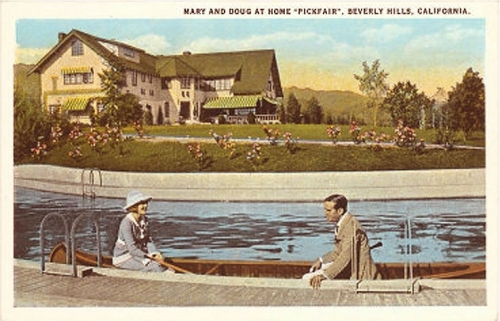Hollywood History - Douglas Fairbanks & Mary Pickford

This article is a simply wonderful read for many reasons and the chief among them is that the journalist hated Los Angeles. The New York writer Karl K. Kitchen was dispatched to Beverly Hills to interview the recently divorced Douglas Fairbanks and Mary Pickford and he seemed to have had a nice enough time with the estranged couple, so much so that the Hollywood Royals invited him to dine at their house. The whole article is written in a very chatty way and there is one small, but distinct, slanderous aside referring to Jewish power in the nascent film industry.
Attached is a very funny article written by the great matinee idol Douglas Fairbanks (1883 – 1939) concerning the predictability of silent films: "Whether eastern or western, the villain is never without a big black cigar. On the screen a big black cigar represents villainy; on the stage it represents General Grant."
Click here to read magazine articles about D.W. Griffith. When this two page profile appeared in print Pickford was world famous, married to the handsomest actor in Hollywood, adored by all - she could do no wrong. Just fourteen years later, the respected New York playwright Clara Boothe Brokaw would ridicule her in the pages of Vanity Fair (August, 1932: p. 18) as a sad symbol representing a vulgar era.
As if that wasn't bad enough, today few people know who she was - although she does get twice as many Google searches than Lillian Gish (but whose counting).
Amazon offers a PBS salute to the actress on a DVD that is strangely titled Mary Pickford . .
This article was written by the silent film star herself for a fashionable American magazine concerning "a few of the difficulties in the way of dress, make-up, manners and technique" an actress might consider before portraying a child on stage or screen.
Yet another article from the dusty, moldy magazines of yore that illustrate how the silent film actor Douglas Fairbanks (1883 – 1939) would, time and again, bite that hand that fed him so generously: this is one more example in which Fairbanks points out the all-too predictable story lines of American silent movies. I haven't a clue as to whether California lawyers had the "Restraining Order" as one of the tools in their arsenal back in 1916; but if they had, Mary Pickford might have chosen to deploy just such a legal measure in order to defend herself from this obsessed fan who wrote the following essay for the editors of MOTION PICTURE MAGAZINE:
"She is adorably feminine, from her curls to her toes. In Tess , Caprice, the forlorn waif of the desert island in "Hearts Adrift", she is feminine in everything she does. She can storm, but she storms like a warm-hearted, human woman, not a virago; she can coquette , Caprice, the forlorn waif of the desert island in "Hearts Adrift", she is feminine in everything she does. She can storm, but she storms like a warm-hearted, human woman, not a virago; she can coquette , but it is never the cold blooded type of flirting; Mary Pickford couldn't be cold blooded if she tried. Men of all ages, women of all types, children of both sexes respond to this wonderful little girl in a manner no other star is able to arouse. They are all good and have done some wonderful work, but Mary is child, sweetheart and friend of the whole world, and no one can ever take her place in our hearts." , but it is never the cold blooded type of flirting; Mary Pickford couldn't be cold blooded if she tried. Men of all ages, women of all types, children of both sexes respond to this wonderful little girl in a manner no other star is able to arouse. They are all good and have done some wonderful work, but Mary is child, sweetheart and friend of the whole world, and no one can ever take her place in our hearts."
Click here to read a 1923 comparison between Norma Talmadge and Mary Pickford. |
MORE ARTICLES >>> PAGE: * 1 * 2 * |
|